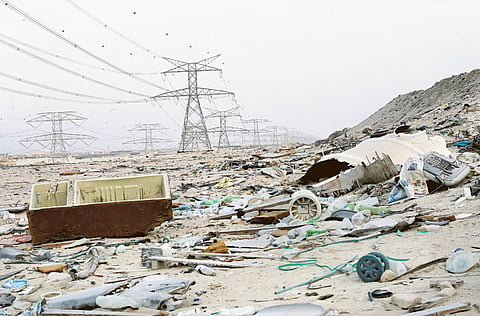Dubai's Al Ghusais garbage dump will reach maximum capacity in 8 years
Dubai Municipality banks on recycling and waste management to reduce burden

Dubai: The need for consumers to recycle and reduce energy consumption is at an all-time high as one of the city’s landfills is expected to reach its maximum capacity within eight years.
With the looming death knell being sounded for the garbage dump, municipal officials overseeing the facility say increased recycling efforts to keep plastics, paper and glass out of the landfill are critical.
“It is essential that we reduce our consumption of waste because the landfill we have now in Al Ghusais is almost full and has the capacity to operate for a maximum of eight years more,” said Salah Amiri, Assistant Director General for Environmental and Public Health Services Sector at Dubai Municipality.
The new landfill will be located at Al Layan 2 — an industrial area near the border of Abu Dhabi — and will be two kilometres long and two kilometres wide.
The civic authority said its campaign to reduce waste and enhance recycling has paid off because the yearly amount of rubbish once permanently relegated to landfills has dropped markedly.
In 2013, municipal statistics recorded as much as 2.6 million tonnes of garbage being send to the landfill, 900,000 tonnes less than the 3.5 million tonnes sent to landfill in Dubai in 2010.
“All our efforts are aimed at reducing waste so there will be less of a burden at landfills. And part of that reduction comes with the residents’ contribution in recycling their waste,” explained Amiri.
The drop in garbage going to landfill is no small accomplishment given that the population of Dubai increased.
According to Dubai Statistics Centre, the population of Dubai grew from 1.9 million in 2010 to 2.1 million in 2012.
To combat the increasing number of waste generated from residents, authorities from the civic body said that it needs to continue its awareness campaign among communities in order to achieve the target of Dubai 2030.
The Dubai Integrated Energy Strategy for 2030 aims to reduce energy demand by 30 per cent, as well as zero waste by 2030.
Speaking on the sidelines of the Middle East Waste and Recycling exhibition in Dubai this week at Dubai World Trade Centre, Abdul Majeed Saifaie, director of Dubai Municipality’s waste management department, highlighted the need to address the challenges facing fast growing economies like the UAE.
“Dubai Municipality is looking to further increase the integration of waste and environmental solutions in order to promote a cleaner and more sustainable city for the future,” said Saifaie.
As Dubai Municipality continues its efforts to change the mindset of residents and encourage them to recycle, the benefits can be clearly seen as the amount of collected waste has come down from 13,895 tonnes in 2010 to 9,194 tonnes in 2012. According to municipal statistics, Dubai residents contribute to almost 2.7 kilograms of waste per day.
‘Waste management is one of the biggest challenges facing fast-growing economies and it is crucial to explore innovative and sustainable ways to manage waste. To deal with the growing waste problem, Dubai Municipality has already prepared its Master plan 2030 for solid waste,” he said.



